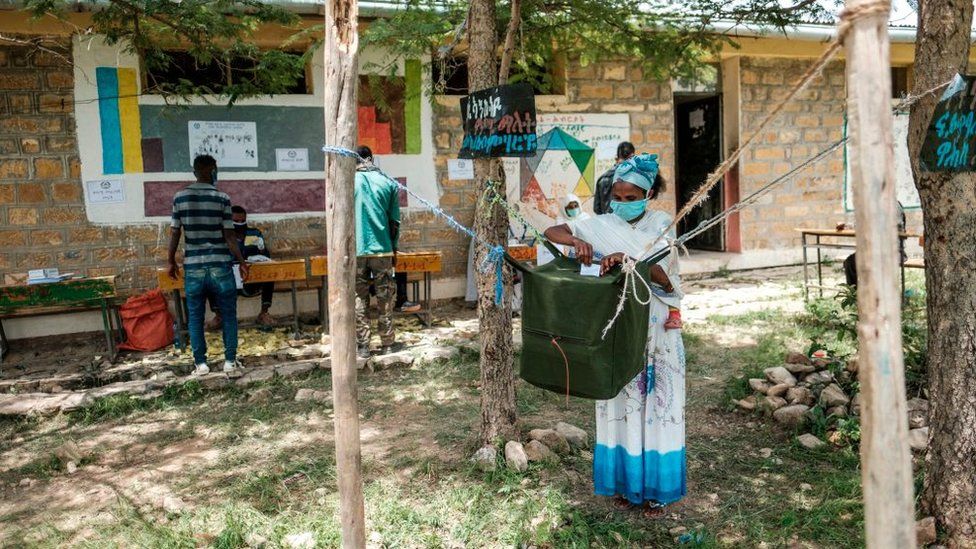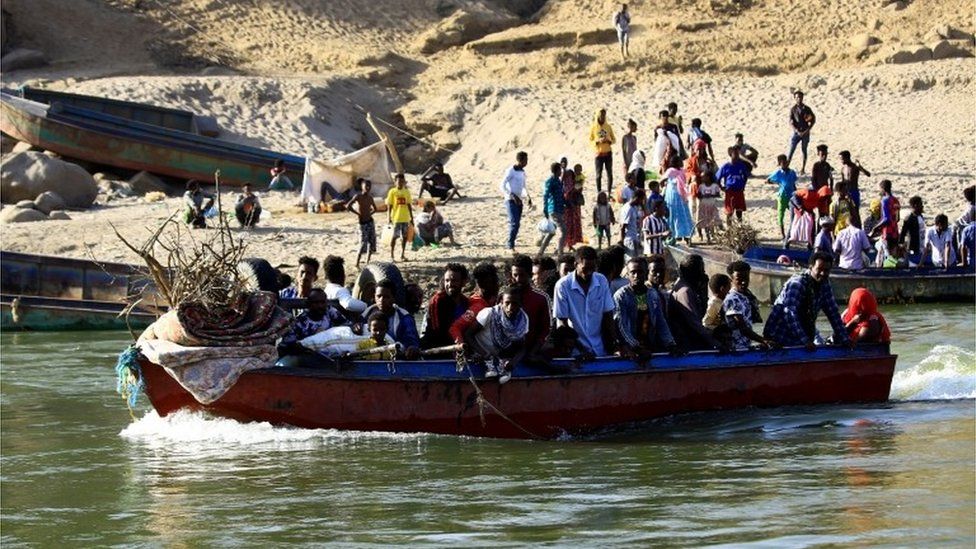A BBC reporter writes about a relative forced to flee Ethiopia’s Tigray region following the outbreak of conflict between federal and regional troops.
A businessman and farm-owner, my uncle has become a refugee in Sudan, along with tens of thousands of others. He does not even have a pair of shoes, having lost them as he fled Tigray by foot and boat.
He was not expecting a conflict to break out. So, in the beginning of November, he undertook a half-day-long journey from his home near Adwa city in central Tigray to the agricultural hub of Humera in the west, leaving his wife and two children behind.
This is what he normally does at this time of the year, going to his farm in Humera to harvest his sesame and sorghum crops in order to sell them in markets around Tigray and Sudan.
Then, his life – like that of many other people in Tigray, which has a population of about eight million – turned upside down.
Investment corridor hit by fighting
Prime Minister Abiy Ahmed announced that he had ordered a military operation to oust the Tigray People’s Liberation Front (TPLF) from power in Tigray because, he said, it had crossed the “final red line” by seizing control of federal military bases in the region.
Tensions had been escalating for some time, with the TPLF-controlled regional government organising elections in Tigray in September in defiance of a decision taken at federal level to postpone all elections, which were due in August, because of coronavirus.

Mr Abiy condemned the regional election as illegal while the TPLF said it no longer believed that he was legitimately in office as his mandate to govern had expired.
About a week after the conflict started on 4 November, Ethiopian troops – backed by the neighbouring Amhara regional government’s special forces and militias – captured Humera from Tigray government forces.
Humera has a population of about 30,000 people, and was part of an investment corridor aimed at boosting development. Its crops – especially sesame and cotton – are exported, including to the US and China.
This is highly unlikely to happen this year. My uncle said that he saw some crops set ablaze in the conflict, but he does not know whether his were affected.
‘My uncle fled at night’
The military operation caused ethnic tensions to boil over, with both Tigrayan and Amhara civilians killed in the fighting for control of Tigray, although rival forces deny targeting civilians.
My uncle is Tigrayan and, he said, there was much looting of Tigrayan-owned properties and killings. He said he realised how much his life was in danger when he noticed that Amhara labourers – who had been working and living peacefully with them – were now telling the Amhara special forces and militias where to find Tigrayans in Humera.
My uncle said there was also heavy shelling from the direction of Eritrea, though the governments of both Eritrean President Isaias Afwerki and Mr Abiy have denied that Eritrea joined the military operation against the Tigray government.
Fearing for his life, my uncle surreptitiously left Humera at night, with none of his belongings, walking a long way until he reached the Tekeze River. There, he found hundreds of other Tigrayans. They all climbed into boats to cross into Sudan.
He said he was relieved to reach the UN refugee centre, but, he told me, the tents were so crammed that he slept out in the open.
He called me from a Sudanese mobile phone number, saying he had borrowed someone’s phone as his Ethiopian number was not working at the refugee centre.
After that one conversation more than two weeks ago, I have not heard from him, and I have been unable to get through to him. With phone lines in many parts of Tigray still down, his wife and children do not know he has become a refugee in Sudan.
‘Air strike made my family move’
And I cannot tell if his family have fled their home – Adwa was one of the towns that Ethiopian troops took before they captured Mekelle, the capital of the Tigray region.
My parents and siblings live in Mekelle, and I – like thousands of others in the diaspora – have no idea whether they survived the heavy shooting and shelling that affected the city for most of Saturday.
The International Committee of the Red Cross says the main referral hospital is struggling to treat the wounded, and there is also a shortage of body bags.
The TPLF said 19 civilians were killed and more than 30 wounded by the Ethiopian army in Mekelle alone, but Mr Abiy said not a single civilian has been killed throughout the weeks-long military operation in Tigray.
I last heard about my family through a contact. This was after the Ethiopian military carried out an air strike on 16 November near the university campus in Mekelle.
‘The most difficult time in my life’
My parents and siblings lived around the campus so, the contact told me, they had decided to abandon their home – which has been in the family for generations – to move in with friends in another part of the city.
I have still not been able to reach anyone in Mekelle. This is the most difficult time in my life, and, all I can do from abroad, is pray for their safety and that of everyone else.
In recent years, there has been conflict in many parts of Ethiopia, which forced nearly two million people to flee their homes. But there was stability in Tigray.
This has now changed, and although Mr Abiy has declared the military operation over after the capture of Mekelle, there are still reports that fighting and air strikes are continuing in some parts of Tigray.
We do not know when the nightmare will end; when the healing of wounds will start; when families will be reunited and achieve closure if they lost loved ones; when all schools will reopen; when electricity and water supplies will be back; when farming and business will resume, when – to put in a nutshell – life will return to normal.
We have not named the people in this report for safety reasons.














